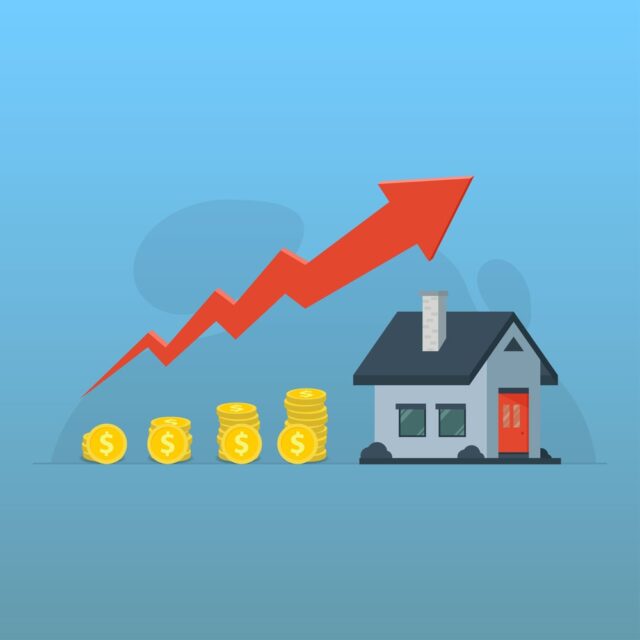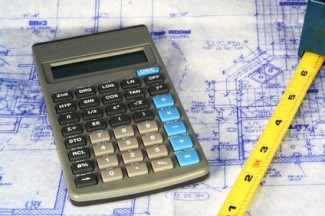Are you wondering how to determine home value? If so, you’re not alone.
Determining a home’s value isn’t as simple as counting rooms or measuring square footage. It considers many factors, like location, size, age, condition, and the local housing market.
Fun fact: even the number of bathrooms can impact your home’s worth. Time to look at our living spaces under a magnifying glass!
The most effective methods for determining home value in Massachusetts include using online home valuation tools, hiring a professional appraiser, consulting a REALTOR®, and pulling ‘comps’ on similar properties.
Each approach offers valuable insights, but working with a professional appraiser typically yields the most accurate assessment due to their expertise in considering various factors influencing a property’s value.
The second best method for calculating home values is using an experienced real estate agent.
It is critical for buyers and sellers to have an accurate property valuation in real estate. From thirty-eight years experience in the industry, determining value can be challenging.
Everyday there are thousands of properties across the U.S that have price reductions. This provides evidence that either the listing agent priced it wrong or the seller didn’t listen to their guidance.
Calculating home value isn’t as easy as it seems. Many subjective variables go into valuing a home in Massachusetts.
Let’s examine everything you should know.
Factors Influencing Home Value in Massachusetts
When valuing a home, several elements come into play, all contributing to the final price tag. The location holds immense importance.
Location
A house’s neighborhood and its proximity to essential amenities like schools, parks, and public transportation can profoundly impact its value. Furthermore, the area’s general safety and crime rates influence prospective buyers’ decisions.
For example, there are two towns where I provide real estate services abutting each other: Milford and Hopkinton, Mass. However, the home values of substantially similar properties can be vastly different.
The value of the home in Hopkinton could be over $100,000 more! It’s because Hopkinton is a far more desirable community due to schools, attractions, and a small-town feel.
There are examples like this all over the state.
A study by Research Gate showcases how location can have a dramatic impact on values. Positioning a residential property within a city directly impacts its market value.
Each location signifies distinct factors, including accessibility, neighborhood, traffic, socio-economic status, and proximity to green spaces.
Square Footage
The size of a property is another vital factor to consider. The number of bedrooms and bathrooms compared to similar homes in the area can sway the valuation.
Larger houses often command higher prices but may not always align with the needs of potential buyers.
The Age
The age of a property is an influential element. Newer or well-maintained homes tend to be valued higher than older ones due to their modern conveniences and updated features. However, sometimes older homes with historic appeal can also command a premium.
For instance, let’s consider two homes of equal size and location, one built in 2000 and another in 1970. The newer one may have better insulation, modern infrastructure, and contemporary designs that appeal to many buyers.
The Home’s Condition
Property condition significantly impacts valuation as well. The interior and exterior condition of a house can affect its appeal and market value.
Homes in excellent repair tend to have higher appraised values than those needing significant repairs or showing signs of neglect.
These real estate red flags can drop property values when they are significant.
Market Conditions
Lastly, an essential component to consider is the prevailing local housing market conditions at the time of the assessment.
Fluctuations in supply and demand, interest rates, and economic conditions can significantly impact property values. Shifts in market conditions may either increase or decrease the perceived value of a home.
In Massachusetts, there has been a strong pattern of homes increasing in value in the spring market. Over the last several years, you could determine the value of a house in December, and by April, it would have changed substantially.
This is a vital factor for buyers and sellers when making buying and selling decisions. Timing can be crucial.
By recognizing these key influencers on home value, you’ll be better equipped to evaluate your property accurately, understanding how each distinct factor shapes the overall worth of your home.
Now equipped with this understanding of home valuation factors, let’s transition into analyzing the fundamental components that make up the value of a house in more detail.
Evaluating Home Basics of Massachusetts Properties
When evaluating a home’s value, it’s essential to consider its fundamental characteristics. These basic elements form the core of a property’s worth and play a significant role in determining its market price. Let’s examine these key aspects one by one.
Bedrooms and Bathrooms
Number of Bedrooms and Bathrooms: The number of bedrooms and bathrooms is crucial in determining a home’s value.
Generally, homes with more bedrooms are valued higher as they offer additional living space, privacy, and flexibility for residents or potential buyers.
Similarly, adequate bathrooms are essential, especially for families or larger households.
For example, due to its increased functionality and convenience, a 3-bedroom, 2-bathroom home may be more desirable than a 2-bedroom, 1-bathroom property. This enhances the home’s overall appeal and potential value, making it more attractive in the real estate market.
From experience selling Massachusetts homes, the difference can be substantial. For first-time sellers, it is essential to understand these nuances.
Square Footage and Lot Size
Square Footage and Lot Sizes: The square footage of a home and the size of its lot greatly influence its valuation. More extensive square footage means more living space and can contribute to a higher appraisal value.
Similarly, a spacious lot can add to a property’s overall appeal and resale value.
A larger lot size provides more outdoor space and potential for future expansion or development. It can also enhance privacy and create a sense of exclusivity for homeowners.
Consider two similar homes in design and layout, but one occupies a more considerable one-acre lot with ample outdoor space.
The property with the larger lot size is likely to command a higher market value due to the additional land and potential for customization or landscaping.
Floor Plan
Overall Layout: A home’s layout and configuration contribute significantly to its perceived value. A well-designed layout that maximizes space utilization, flow, and functionality can positively impact the property’s worth.
An open floor plan, strategically positioned rooms, natural light exposure, and efficient use of space all contribute to the desirability and valuation of a home.
The property’s arrangement and flow of rooms can significantly influence its appeal to potential buyers.
From experience, you can have two homes with one having a few hundred more square feet than another. It is possible the smaller home can “feel” bigger because it has an exceptional layout.
Popular designs can impact the sales price of a home. It has been shown over and over again.
Examining these core elements provides valuable insights into understanding a home’s foundation and potential market value.
By carefully evaluating these fundamental characteristics, homeowners and potential buyers can make informed decisions regarding property valuation and investment opportunities.
Now that we’ve explored these fundamental aspects let’s delve deeper into additional factors determining a home’s value.
Massachusetts Market Prices and Location Relevance
When evaluating your home’s value, the neighborhood and local market play a vital role. A well-maintained house in a sought-after area can command a significantly higher price than a similar property in a less desirable location.
Consider this: The neighborhood’s desirability, such as access to good schools, amenities, public transportation, safety, and overall community appeal, dramatically influences a home’s worth.
Buyers are often willing to pay a premium for homes located in areas with low crime rates and convenient access to popular shopping centers, restaurants, and recreational facilities.
For example, homes located near high-rated schools tend to attract families with children seeking quality education for their kids. This increased demand can drive up property prices in these neighborhoods.
Similarly, commuting professionals highly value easy access to public transportation or major highways.
Understanding recent sale prices of comparable homes in the same area is also essential for gaining valuable insights into the local market.
By analyzing recent comparable sales data for properties with similar characteristics (e.g., size, age, and condition) in your neighborhood, you can gauge the current market trends and assess your home’s value.
It’s important to remember that economic growth, job opportunities, and planned developments in the vicinity can also impact property values.
A thriving local economy often leads to increased demand for housing and may result in rising property values over time.
Home Condition and Its Enhancements
When determining your home’s value, the condition of your property plays a crucial role. It’s not just about the overall appearance; it’s also about the quality of the construction and the maintenance history.
These factors are essential for understanding your property’s current and potential value.
First, let’s talk about renovations. Adding new features or updating existing ones, like modern amenities, kitchen renovations, or bathroom upgrades, can significantly increase your home’s worth.
For example, a brand-new kitchen or bathroom can add substantial value to your property. On average, a kitchen renovation increases home value by 10-15%, while a bathroom renovation boosts it by 5-10%.
These improvements enhance visual appeal and create a more functional and attractive living space.
Moreover, energy-efficient upgrades such as solar panels, windows, or insulation can positively impact your home’s value.
Energy-efficient features benefit the environment and attract potential buyers seeking cost-effective and sustainable properties. Generally, such upgrades can increase a property’s value by 1-3%.
Landscaping improvements are another way to enhance your home’s value. A well-maintained garden, appealing outdoor spaces, and proper landscaping can boost your property’s value by 5-11%. Furthermore, adding a deck or patio can increase the charm of your home and raise its value by 2-5%.
Consider how replacing old windows with energy-efficient ones improves your property’s aesthetics and brings economic benefits.
On average, replacing windows adds value amounting to 50-60% of the cost of the new windows, making it a lucrative investment in both comfort and financial return.
Taking Home Value to New Heights
Understanding how the condition of your home and its enhancements affect its value is crucial for accurate valuation. Renovations, energy-efficient upgrades, landscaping improvements, and modern amenities elevate your property’s worth.
Investing in these enhancements creates a more comfortable living space for yourself and potentially significantly increases your property’s market value.
With a deeper understanding of how various factors contribute to a home’s value, let’s shift our focus toward the pivotal role appraisals play in determining the true worth of a property.
Role of Appraisals in Massachusetts Home Value Determination
Professional appraisals are vital for understanding the actual value of your property. When pricing something as valuable as your Massachusetts home, trust in anyone’s opinion won’t suffice.
This is where a qualified appraiser comes into play. They act as the detectives of the housing world, investigating every aspect of your property to uncover its actual worth.
A qualified appraiser has been trained and licensed to evaluate all property types correctly. They possess the expertise to compare your property with recently sold similar properties in the area. Skilled appraisers can form the basis for their unbiased and expert opinion of your property’s value.
When an appraiser considers the value of your property, they don’t merely observe it from the outside; instead, they inspect both the interior and exterior. Appraisers look for several things to complete their analysis.
They scrutinize the condition of your house, including any repairs or enhancements you might have made, while also considering your neighborhood and recent sales of similar homes.
The Appraisal Process
The appraisal process involves a comprehensive assessment that includes:
- Physical Condition: Appraisers evaluate the overall condition, as well as other external elements such as the roof, foundation, and landscaping.
- Location: They consider the location of your property and its proximity to essential amenities, schools, transportation, and local attractions.
- Comparable Sales: Appraisers use data from recent comparable sales in the area to gauge the market value of your property.
Unbiased Evaluation
One key advantage of an appraisal is that it provides an unbiased evaluation, unlike other methods, such as online tools or comparative market analysis by real estate agents.
An appraisal offers an independent and professional perspective, considering concrete characteristics and financial dynamics that may influence a property’s worth.
For instance, if you’ve made significant improvements to your property, like installing energy-efficient systems or remodeling bathrooms, a trained appraiser ensures these enhancements are factored into their assessment.
Professional appraisals offer indispensable expertise and neutrality when understanding your property’s value.
Their careful consideration of physical condition, location, and comparable sales provides a reliable foundation for accurately pricing your property, whether selling or refinancing, ensuring a clear understanding of your home’s worth.
The cost of a real estate appraisal is worth it to nail down an accurate evaluation.
In navigating the intricate landscape of determining home value, it’s crucial to discern between appraised and market value.
Next, we’ll explore this critical distinction in assessing the worth of property.
Appraised Value vs. Market Value Comparison
When considering the worth of your property, it’s crucial to differentiate between the appraised value and the market value. The appraised value is determined by a licensed appraiser who evaluates various factors such as the home’s condition, location, recent sales of similar properties in the area, and current market trends.
This evaluation aims to provide an unbiased assessment of the property’s worth based on these criteria.
On the other hand, market value refers to the price at which a potential buyer would be willing to purchase the property. It’s influenced by the property’s desirability, current market demand, and prevailing economic conditions.
Unlike the appraised value, which is calculated based on predefined criteria, market value is more dynamic and responsive to fluctuations in the real estate market.
Understanding the difference between these values is crucial for homeowners because it affects their decisions about pricing their property for sale, taking out a mortgage refinance, or making significant renovations.
Knowing how both values are assessed and what factors influence them can empower homeowners to make informed choices.
For instance, imagine you’re considering refinancing your mortgage. If you know the appraised value of your home, it helps you understand what lenders might consider your property worth. However, understanding the market value becomes much more critical when deciding whether to sell your home on the open market.
Moreover, the appraised value is pivotal in mortgage lending because lenders use it to determine how much money they’re willing to lend for a property. In contrast, market value can fluctuate based on buyer demand and local economic conditions at any given time.
Comparing the appraised value to the market value provides homeowners with valuable insights for making sound financial decisions regarding their property.
Understanding these nuances gives homeowners essential knowledge when navigating the complex landscape of real estate transactions.
In a world where critical financial decisions revolve around concrete property valuations, understanding the distinction between appraised and market values is an indispensable compass for homeowners seeking financial prudence. It equips them with unwavering confidence in their real estate undertakings.
Real Estate Market Analysis From An Agent
An experienced real estate agent or broker in the local market can also help calculate home value. The key is working with someone who has many years under their belt.
A rookie should not do something as vital as property valuation. A track record of success is crucial for buyers and sellers.
A real estate agent prepares a comparative market analysis (CMA) to provide clients with an accurate assessment of a property’s value to similar properties in the area. The process begins with collecting data on recently sold properties, those currently on the market, and those listed but not sold.
This data is crucial for establishing a baseline for the property’s value and understanding market conditions.
Careful Analysis is Vital
Once the data has been collected, the real estate agent analyzes the information to identify comparable properties that closely match the subject property in terms of size, location, condition, and other relevant factors.
The agent will also consider any unique features or upgrades impacting the property’s value. This careful selection of comparable properties is essential for ensuring the accuracy of the CMA.
After identifying the comparable properties, the real estate agent adjusts to account for any differences between the subject property and the comparables. This may include adjustments for differences in square footage, number of bedrooms and bathrooms, lot size, and other relevant features.
These adjustments help to refine the estimated value of the subject property and provide a more accurate assessment for the client.
Finally, the agent compiles the data and analysis into a comprehensive report outlining the comparative market analysis findings. This report is a valuable tool for clients, providing them with the information they need to make informed decisions about pricing their property for sale or offering a new home.
Preparing a comparative market analysis requires attention to detail, thorough research, and a deep understanding of the local real estate market to provide clients with the most accurate assessment of a property’s value.
Avoid Calculating Home Value With These Methods
When determining home value in Massachusetts, specific methods should be avoided. Looking at a home value estimator, an assessed property tax value and price per square foot is perfect for valuation mistakes.
These tactics can be incredibly misleading and often inaccurate assessments of a property’s value. They are used by amateurs who don’t know what they’re doing.
These methods, while easily accessible and seemingly straightforward, fail to consider many factors that can significantly impact a home’s value.
Relying solely on these methods to determine a property’s worth can lead to misinformed decisions and potentially costly errors.
Avoid Zillow Home Value Estimates
While convenient, online home value estimators like Zillow use algorithms and often outdated or incomplete data. They may not consider recent renovations, neighborhood developments, or other factors significantly impacting a property’s value.
These estimators cannot assess a home’s unique features and characteristics that can significantly influence its desirability and market value.
You may have just finished your basement or remodeled your master bath. Do you think Zillow knows this? Did the Zillow rep visit your house (I’m laughing)? Do they see the quality of these renovations?
Looking at Zillow for your property value might be fun, but never use it to make business decisions.
Your Assessed Value is NOT Market Value
Local government authorities determine assessed property tax values for taxation and may not accurately reflect the current market value of a property.
These assessments are often based on mass appraisals. They may not consider specific property details affecting its value, such as its condition, location, or recent sales of comparable properties. They are often outdated, with an assessor not visiting the property.
Looking at your assessed value as having any correlation to your actual value would be a significant mistake.
Price Per Square Foot
Price per square foot is a commonly used metric for comparing properties. Most of the time, it is used by inexperienced Realtors who are looking for valuation shortcuts.
It fails to account for location, the quality of construction, layout, and other important factors contributing to a home’s overall value.
A property with a lower price per square foot may not necessarily be a better deal if it lacks desirable features or is in a less desirable location.
Tom Horn, a veteran Birmingham appraiser, shared his expertise with me. “Bill using price per square foot is an inaccurate valuation method. If only things were that easy.
Price per square foot is a statistic that doesn’t adequately examine a property’s value.
Focusing solely on the price per square foot places greater emphasis on the fluctuating value rather than the dependable physical characteristics of the property.
It is important to note that the perceived value of a home can be subjective, as individuals often have a predetermined idea of its worth, which may influence their decision-making when choosing comparable sales.
When considering the price per square foot, it is crucial to consider all the property’s physical characteristics. These attributes are essential for comparing sales during comp selection, as they determine the property’s value.”
Conclusion
How to determine home value is a topic that’s crucial for real estate agents, buyers, and sellers. Determining property values in Massachusetts should be done by a competent appraiser or Realtor.
While online home value estimators, assessed property tax values, and price per square foot can provide a starting point for understanding a property’s value, they should not be relied upon as the sole or primary methods for determining its worth.
It is essential to consider a wide range of factors, including the property’s condition, location, recent sales of comparable properties, and market trends, to assess a home’s value well.
Consulting with a professional real estate appraiser or agent can provide a more accurate and comprehensive understanding of a property’s worth.
If I can provide any assistance in valuing property in the Metrowest, Massachusetts area, please get in touch with me.















No Comment